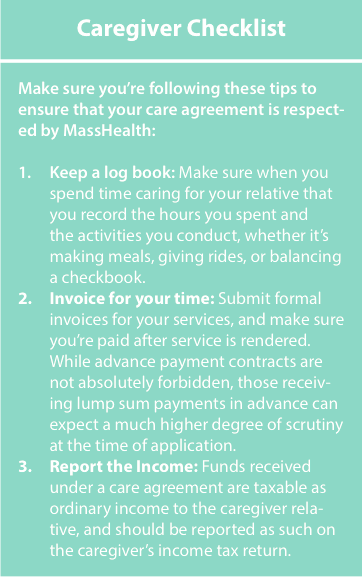Family members using a care agreement for medicaid planning should check that the hour- ly rate they’re receiving accurately reflects the fair market value of the services they’re providing.
While, in certain instances, MassHealth pre- viously allowed applicants to pay relatives between $20 and $25 per hour for proving care services, in recent Fair Hearing Decisions the Agency has taken a hard line approach towards caregiver relatives. In doing so, MassHealth has focused on the fair market value of the services received by the applicant. Although applicants cited personal care rates of around $25 per hour in the private sector as justification for paying their relatives a similar rate, MassHealth argued that private sector providers receive special training, and have administrative and overhead costs which make their rates irrelevant in determining the market value of care rendered by relatives.
Instead, the Agency proposed that the MassHealth Personal Care Attendant (“PCA”) rate (currently $12.98 per hour) be applied in circumtances where family members provide comparable care services for Mass- Health applicants. Consequently, those who pay relatives more than the PCA rate risk a period of ineligibility determined by the difference in the amount transferred and the amount that would have been transferred if the relative had been paid at the PCA rate. Currently, MassHealth will allow caregivers who receive higher rates of pay to “cure” the ineligibility period by transferring the difference back to the applicant. However, if the caregiver does not have sufficient assets to cure the transfer, an ineligibility period, and the cost of private pay long-term-care during that period are likely.
In one recent instance, a MassHealth applicant was successful in charging a higher rate where her caregivers provided exceptional levels of service, in excess of the level of care provided by MassHealth Personal Care Attendants. For example, relatives frequently spent the night with the MassHealth applicant, a service not provided by a PCA. In that case, the hearing officer found that the caregiver relative was justified in charging a higher rate: $17.50 per hour. Significantly, the case also indicated that there was some inherent value in having care provided by a family member whom the applicant trusts, and who is particularly attuned to the applicant’s needs. However, while individual cases are instructive as to how particular arrangements may be viewed, administrative decisions are not binding on the Agency, and MassHealth will determine a proper rate based on the facts and circumstances of each individual applicant.
Given the uncertainty involved in predicting MassHealth’s position in any particular case, future MassHealth applicants and their caregivers should evaluate their hourly rate and determine, based on the types and scope of services provided, whether a rate higher than the PCA rate is justified. Further, if it is determined that a higher rate is justified, the funds transferred in excess of the PCA rate should be put aside by the caregiver in case a “curing” transfer back to the applicant is necessary to avoid a period of ineligibilty.
Finally, MassHealth applicants should be aware that, to avoid disqualifying transfers, care must be taken to follow the formalities of a typical, arms-length transaction be- tween unrelated parties. Caregivers who do not provide contemporaneous records of hours worked and activities performed, for example, may have their their pay un- der the care agreement characterized as a disqualifying transfer.
Tags: care agreement, elder, elder care, elder law, masshealth



